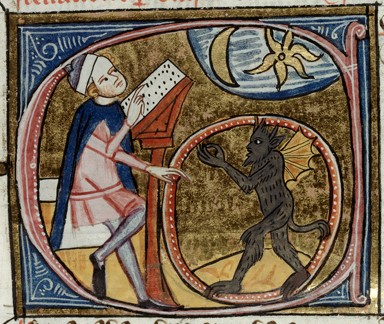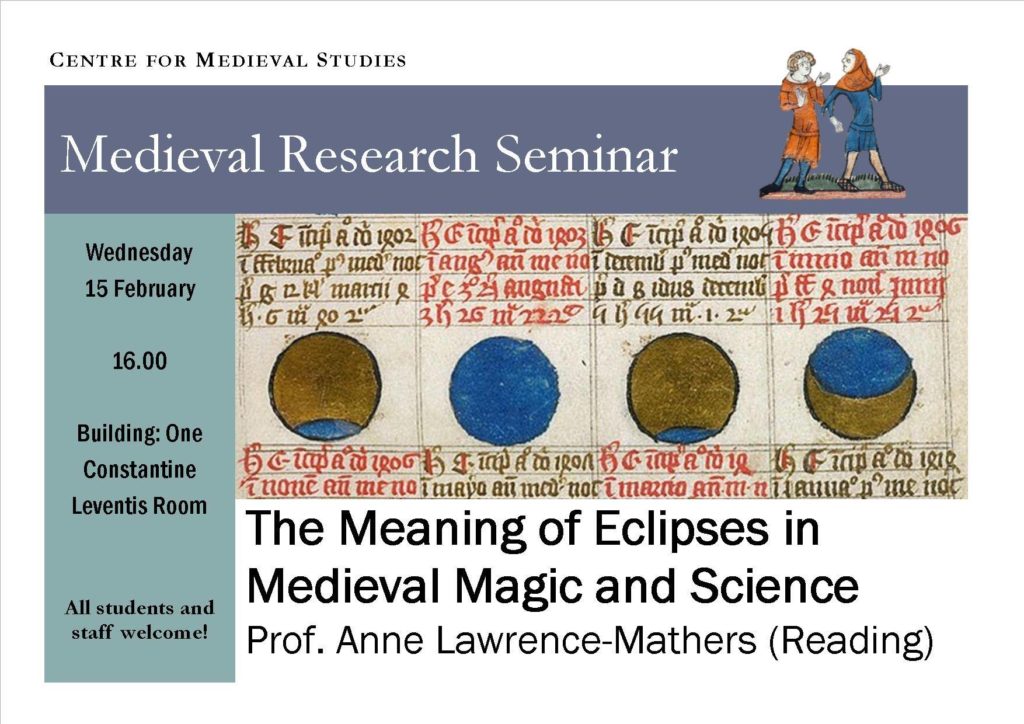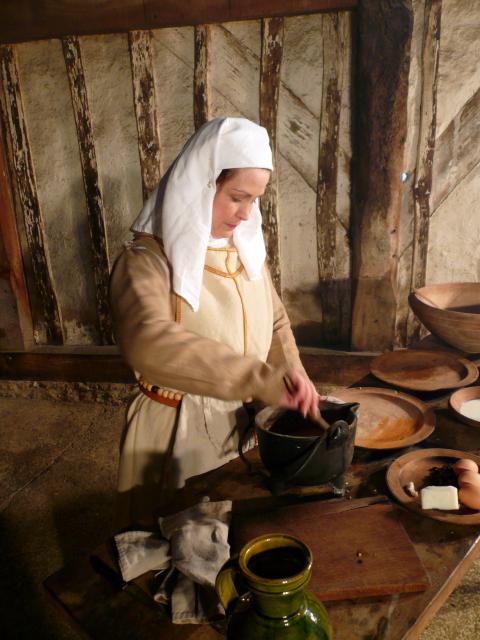
Posted by Jennifer Farrell
10 March 2017Interviewers: Éléonore Raymakers, Emma Prevignano and Lauren Lloyd

On Wednesday 15 February, Professor Anne Lawrence-Mathers (University of Reading) visited the Centre for Medieval Studies here at the University of Exeter. Prof. Lawrence-Mathers presented a paper entitled ‘Solar Eclipses: Signs, Portents or Science?’ and we were fortunate enough to meet her and interview her informally for half an hour beforehand. As final year history students studying Magic in the Middle Ages as our special subject with Dr Jennifer Farrell, we had discussed Lawrence-Mathers’ The True History of Merlin the Magician and were excited to hear her take on some of the questions we had prepared. It was a great opportunity to hear from someone currently engaged in an area of scholarship relevant to our recent studies and also to discuss the reasons why magic is valuable, both in its own right, and for the insight it gives into other aspects of the Middle Ages. We decided to focus on Merlin’s character and the significance of his association with natural magic in Geoffrey of Monmouth’s History of the Kings of Britain. Dr Farrell had provided us with a context to work with from our seminars and Exeter’s own Dr Catherine Rider (another important scholar whose work we have used) was also present at the interview and contributed some of her thoughts to the conversation. The opportunity to discuss what we had learned with Prof. Lawrence-Mathers in person was both illuminating and insightful, and will hopefully stand us in good stead for our upcoming exams!
Anne Lawrence-Mathers: As strange as it might sound, it was a hobby from when I was a teenager: one of my first jobs was working in Portsmouth Central Library at weekends. Its part in the national interlibrary loan scheme was the history of magic and the occult, so I used to hide behind my re-shelving trolley and read loads of books on the history of magic – and I have been keen on it from then on.
ALM: I was the kind of teenager who would have been a goth if they had been invented back then! It was just something that had a serious history, but was a bit outside the mainstream. At the time the history I was taught at school was the nineteenth century and it was all extremely worthy and fact-based, one reform act after another. This just attracted me as something much more interesting.
ALM: I think this is part of the reason why it has taken so long for the history of magic to be taken seriously. Medievalists have seen themselves as almost on the defensive, showing that medieval history is serious. In my experience, medieval history has been very dominated by political historians and historians of the church. But magic, being categorised under superstition, is something that professional historians were a bit shy of because of the fear that it would play into the stereotype that everyone in the Middle Ages was very stupid and very superstitious and very ignorant. Because obviously only the stupid, the superstitious and the ignorant would believe in magic.
CATHERINE RIDER: Once, in a job interview, I was asked whether magic was ‘a bit marginal’. That is the kind of attitude.
ALM: The paper I’m about to deliver this afternoon, it started off with me being mildly outraged that someone, a very distinguished man [the director of the Science Museum] came to Reading and gave a paper about art relating to eclipses, art depicting solar eclipses. To give him credit, he covered the Middle Ages, but what he basically said was that the people were very stupid, that they didn’t understand eclipses and that their art is full of religious stereotypes. The same attitude is still around.
ALM: I think that it is always worth trying to analyse the past in its own terms. So much of the older approach to the history of magic that I have read starts out with a complete assumption that we all know what magic is. That assumption is based on the work of the classic anthropologists of the early twentieth century and is basically something used by those who, for whatever reason, don’t have science to interpret the world. I think that, in the medieval world, the boundary between what was magic and what was science was moving as things changed, as new ideas and technologies arrived and were developed. My working definition is that magic was what was dangerous or forbidden in some way, so not a specific content. As those attitudes hardened, theologians and natural philosopher were more and more saying that supernatural power can only come from God or from the Devil, put very crudely. Magic usually claims to be operating with angels and trying to reach God but it is always perceived by outsiders as being in contact with demons and the realm of the Devil. That is why, I think, the boundary keeps shifting: what is considered technology is not magic; you don’t need the Devil for that. It seems to me we still have that shifting boundary in the world of science. The ethical debates over fertility and children, for example, the issue of how far is it okay for doctors to use the genetic technologies that affect a foetus before it is born. We still say that it is up to society to decide what you can or cannot do. I think there is a comparison there.
ALM: I don’t know about assessing it, but certainly, in my own experience, it helped a lot when I learned astrology, in a very amateur way, and learned how horoscopes were cast and how to use planetary tables. I haven’t yet learned how to use an astrolabe properly; that’s next on my list. Proper replicas are expensive; I’ve tried downloading some material from the internet and making my own Blue Peter version, but it didn’t work very well! I think that just the experience of seeing how much work is involved and how difficult those calculations are, particularly if you’re using roman numerals, can make you appreciate how difficult this work actually was.
ALM: I would say the texts classified as ‘prognostics’, which is another ‘modern term’, a rather diminishing label for a large category of medieval work and science. They include astrological texts, but not just those. They describe different techniques and technologies for making forecasts of different kinds and they come up in all sorts of collections. Some of them are about calculating the calendar, so you find them in books from big churches; others are about making diagnoses, so you find them in medical collections. Some were included into works on chronology, chronicles, and history, because of the perception that everything was linked together and that the natural world worked as this amazingly complicated mechanism with time as part of it. Calling these things superstitious and magical and just ‘little prognostics’ really diminishes them. They were really widespread and played a big role in medieval culture. Plus, these books are not very pretty or highly decorated, so they are not really sought after. Most of them haven’t been digitised and libraries will let you handle them. Sitting there reading these things is sort of fab!


ALM: Particularly with texts on the borders between science and magic, I would say that you need to almost think yourself back into the way medieval readers were taught to read. Often these texts look very short and you have to go through that whole thing of analysing them according to different levels, really thinking around what’s going on. Sometimes these texts are like very simple recipes, but you, the reader, are meant to bring your whole pre-existing expertise and technological experience to it. Often you look at a magical text and you think ‘Really? Is that it? “Take three tea leaves and stir them at dawn?”’. You have to do a lot of work to try to get into what the text is really doing, unless that’s just me. Do you (Catherine Rider) have the same experience?
CR: I don’t work so much on magical texts. I have been doing work on medical recipes and they are very short. Again, it’s kind of ‘take this herb, drink this…’. There is a whole world of scientific understanding behind that and the knowledge of the properties of different herbs, and then the question of what people actually did: did they know how to prepare these herbs? So there’s a lot you have to try to understand about back then.
ALM: Even the details: for example, if this is a magical or a medical text that was around in eleventh-century England and it mentions oil, what kind of oil is that going to be? How far will they have had to source it from? How much is it going to cost by the time it reaches pre-conquest England? Same with incense, which was then only produced in a very small part of the world, and had got to be fetched a very long way by specialist merchants. If you are a bishop or a member of a monastic community fine, you’ve got agents and supply routes, but if you are outside of that how do you get it?
CR: I suppose that’s one reason why scholars have recently argued that monasteries were really good places to do magic. I am thinking of the study on Canterbury by Dr Sophie Page (UCL). In monasteries, they had the ingredients, they had the books, and if the abbot turned a blind eye then no one was really checking…
ALM: And they had the workshops! They would have had a metal working workshop, often a herbarium, certainly an infirmary and most outsiders even the abbot and prior probably, wouldn’t have known. It is like going to a chemist’s shop now: unless you are an expert, you don’t know what everything is for.
The discussion continues in next week’s post…
Éléonore Raymakers, Emma Prevignano and Lauren Lloyd are final-year undergraduates in History